For critics of widening projects, the prime example of induced demand is the Katy Freeway in Houston, one of the widest highways in the world with 26 lanes.
Immediately after Katy’s last expansion, in 2008, the project was hailed as a success. But within five years, peak hour travel times on the freeway were longer than before the expansion.
Matt Turner, an economics professor at Brown University and co-author of the 2009 study on congestion, said adding lanes is a fine solution if the goal is to get more cars on the road. But most highway expansion projects, including those in progress in Texas, cite reducing traffic as a primary goal.
“If you keep adding lanes because you want to reduce traffic congestion, you have to be really determined not to learn from history,” Dr. Turner said.



As with many things there’s not a clear cut answer. I think you could make a strong case for the Katy Freeway expansion being a failure where those resources would have been better spent on other forms of transportation. I’d agree that adding lanes is not always a bad idea, but blindly adding lanes like the US has done for decades has not been a good thing overall, imo. We’re dependent on cars for everything, they’re heating up the planet and they’re a very inefficient solution to the ultimate problem of getting people from point A to B. I’m not so much anti-car as anti-inefficient travel that has saddled us with tons of negative aspects to city life.
deleted by creator
They don’t consider it because they want to be re-elected in the next few years. Fixing a problem that’s more than “the next election” away holds no interest for them, or most of their constituents.